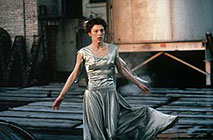|
|
|
|
The
Million Dollar Hotel
|
 |
|
El cielo gira The Million Dollar Hotel starts with a scene as wonderful and mysterious as anything ever filmed by Wim Wenders. A young man, Tom Tom (Jeremy Davies), walks along the roof of a tall, run-down New York building – at first hesitantly, and then with deliberation. He pauses. After a beat's rest (Wenders' mise en scène is always very musical in its rhythms and emphases), the camera swoops into him, searching for clues as to his innermost thoughts. Then, as music builds, Tom Tom runs the full length of the roof and hurls himself off – giving an enigmatic wave to an unseen watcher just before he plummets. The next image is a slow, suspended, point-of-view shot, travelling past and peering into all the rooms of this so-called 'Million Dollar' flophouse. The shot restages anew the final image that Wenders orchestrated for Michelangelo Antonioni's sublime Beyond the Clouds (1995) – a similar panorama of rooms, characters and intrigues all bubbling away at once, forming a sad but solid poem in their disconnection. The entire artistic conceit of The Million Dollar Hotel is contained in this bold, opening flourish. Wenders here returns to the experiments of his earlier work, particularly The State of Things (1982). Afraid of the deathly momentum of a single storyline driving to its inevitable conclusion, he prefers to float among the assorted attractions in a veritable 'House of Fiction', as Rivette did in Céline and Julie Go Boating (1974), or Godard in Detective (1985). One can almost think of the film as a cavernous computer game – with many chambers, many diversions, many 'links' ... but deliberately very few shoot-'em-up thrills. The Million Dollar Hotel was a project that Wenders nurtured over many years, in collaboration with U2's Bono (at a more ambitious moment, it was to be called The Billion Dollar Hotel.) There is a detective plot somewhere in the weave of the film – centred on the investigations of the strange, RoboCop-like Skinner (Mel Gibson) into a death at the Hotel. Gibson, in a controversial Press Conference given in Australia at the time, dismissed the film as "boring as a dog's ass", perhaps because – for his taste – nothing really 'happens', in narrative terms, in it. In a way, Mad Mel was right: don't expect this slender intrigue to provide twists or shocks. Wenders is mainly intent on exploring his very own brand of what is sometimes called, in Australia or Britain, 'quirky comedy'. He does this via a parade of low-life, sometimes wearingly eccentric characters – although Peter Stormare's turn as the hidden member of The Beatles remains rather enjoyable. So much of the movie, in fact, has a 1960s, Nouvelle Vague feel. The jaunty celebration of bohemian poverty pays homage to films by Éric Rohmer (The Sign of Leo, 1959) and Leos Carax (Les Amants du Pont-Neuf, 1991). Tom Tom as a gentle, visionary nut recalls Carax's regular star, Denis Lavant, as well as Billy Crudup in Alison Maclean's Jesus' Son (1999 – itself a '60s throwback). But Milla Jovovich may test the patience of some viewers as Eloise. Like Anna Karina for Godard or Juliette Binoche for Kieslowski, she is rendered by Wenders as an ethereal, haunted figure, a wispy male projection who "gives her body but keeps her soul". Every time she appeared on screen, I remembered a wry comment from a 1980s documentary about Wenders that still sometimes holds true. "All his films boil down to this: life is sad, women are mysterious – so put on another record." As in many counter-cultural films of the '60s (such as Arthur Penn's Alice's Restaurant, 1969), The Million Dollar Hotel pits a vaguely radical community or extended family of free spirits against the fascistic social apparatus symbolised by Skinner. And (like Until the End of the World, 1991) it fires off potshots against corporate mass media and technological surveillance. But politics has never been Wenders' strong point, particularly in his ideologically soft, Christian period inaugurated by Faraway, So Close! (1993). Likewise for sex: as in Wings of Desire (1987), the director's notion of mystical communion between men and women stops short of anything so mucky as physical consummation. This is, in many respects, a minor film in the Wenders canon. Among his other films of the second half of the '90s – a period which I regard as marking a resurgence in his career after the slump begun by Until the End of the World (1991) – it lacks the experimental zest of The Brothers Skladanowsky (1995), the plaintive, structural elegance of Buena Vista Social Club (1999, a great music film), or the intriguing, moody ambiguities of The End of Violence (1997). Yet, for those who can tune into the wavelength of The Million Dollar Hotel, it is also consistently beguiling and pleasurable in a low-level, ambient way – very much like a good piece of lounge music. One thing cannot be denied. Wenders, no matter what film he makes, has the touch of a true director: unfailingly, even within a less than riveting scenario, his combination of a camera movement, a song, and an actor can make one's spirit soar. The Million Dollar Hotel isn't about much more than that – a momentary suspension in which stories stop, people float and the world simply turns, looking rather beautiful instead of mundane and miserable for a change. MORE Wenders: The Blues, Hammett, Land of Plenty, Paris, Texas, Alice in the Cities © Adrian Martin April 2005 |
![]()